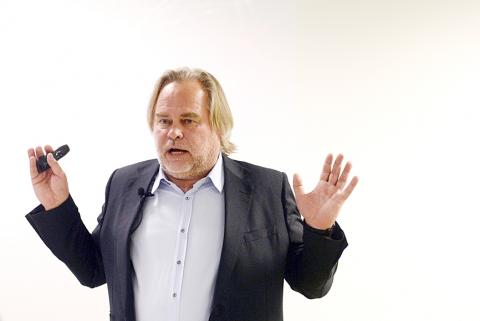The founder of Moscow-based anti-virus software company Kaspersky Lab on Tuesday said he would quit Russia if its intelligence agencies ever asked his company to spy for it.
CEO Eugene Kaspersky said accusations his software had been used by Russian spies to steal US secrets had caused the company’s revenue to decline in North America, but said it was still growing in other parts of the world.
The US Department of Homeland Security has banned government agencies from using Kaspersky Lab software, after concluding that the company’s anti-virus software had been used to copy sensitive files with US secrets.

Photo: Reuters
The company and founder Eugene Kaspersky have strongly denied they ever cooperated with Russian intelligence, although they have said their software inadvertantly copied files containing US data.
“Never, never,” the founder told reporters at a media briefing at the company’s offices in London, when asked if Russian intelligence agencies had ever asked him to help spy on the West. “They have never asked us to spy on people. Never.”
Kaspersky said his company had faced a “tsunami” of media reports and statements from the US government which he said were misleading and unfounded.
Kaspersky said his company’s revenue would top US$700 million globally this year.
However, revenue in North America would be about 5 to 8 percent lower this fiscal year than last year as a result of the US accusations, he said.
Revenue in Europe is expected to be flat, while revenue in the rest of the world would continue to see double-digit growth, he predicted.
Kaspersky, who studied in a KGB institute in Moscow, once served as an engineer for Soviet military intelligence (GRU) before founding his computer security company in the years following the 1991 fall of the Soviet Union. He has repeatedly denied that he has done any favors for his former spy colleagues.
“If the Russian government comes to me and asks me to [do] anything wrong, or my employees, I will move the business out of Russia,” Kaspersky said in English. “We never helped the espionage agencies, the Russians or any other nation.”
He said his products were “designed to stop attacks, to recognize malicious code, not to spy on our customers.”
Kaspersky, 52, said his company was initially confused and shocked by media reports about alleged collusion between his company and Russian intelligence.
He said Kaspersky security software inadvertently vacuumed up source code for malicious software on a computer of a Maryland-based Kaspersky software user in September 2014.
Once a researcher working nearby his office informed him that the code appeared to be tied to classified spying tools believed to be connected to the US National Security Agency, Kaspersky said he immediate ordered the sample to be deleted.
Kaspersky said his company would fight to protect its reputation.
“We will fight,” he said.

Taiwanese suppliers to Taiwan Semiconductor Manufacturing Co. (TSMC, 台積電) are expected to follow the contract chipmaker’s step to invest in the US, but their relocation may be seven to eight years away, Minister of Economic Affairs J.W. Kuo (郭智輝) said yesterday. When asked by opposition Chinese Nationalist Party (KMT) Legislator Niu Hsu-ting (牛煦庭) in the legislature about growing concerns that TSMC’s huge investments in the US will prompt its suppliers to follow suit, Kuo said based on the chipmaker’s current limited production volume, it is unlikely to lead its supply chain to go there for now. “Unless TSMC completes its planned six

Intel Corp has named Tasha Chuang (莊蓓瑜) to lead Intel Taiwan in a bid to reinforce relations between the company and its Taiwanese partners. The appointment of Chuang as general manager for Intel Taiwan takes effect on Thursday, the firm said in a statement yesterday. Chuang is to lead her team in Taiwan to pursue product development and sales growth in an effort to reinforce the company’s ties with its partners and clients, Intel said. Chuang was previously in charge of managing Intel’s ties with leading Taiwanese PC brand Asustek Computer Inc (華碩), which included helping Asustek strengthen its global businesses, the company

Power supply and electronic components maker Delta Electronics Inc (台達電) yesterday said second-quarter revenue is expected to surpass the first quarter, which rose 30 percent year-on-year to NT$118.92 billion (US$3.71 billion). Revenue this quarter is likely to grow, as US clients have front-loaded orders ahead of US President Donald Trump’s planned tariffs on Taiwanese goods, Delta chairman Ping Cheng (鄭平) said at an earnings conference in Taipei, referring to the 90-day pause in tariff implementation Trump announced on April 9. While situations in the third and fourth quarters remain unclear, “We will not halt our long-term deployments and do not plan to

The New Taiwan dollar and Taiwanese stocks surged on signs that trade tensions between the world’s top two economies might start easing and as US tech earnings boosted the outlook of the nation’s semiconductor exports. The NT dollar strengthened as much as 3.8 percent versus the US dollar to 30.815, the biggest intraday gain since January 2011, closing at NT$31.064. The benchmark TAIEX jumped 2.73 percent to outperform the region’s equity gauges. Outlook for global trade improved after China said it is assessing possible trade talks with the US, providing a boost for the nation’s currency and shares. As the NT dollar